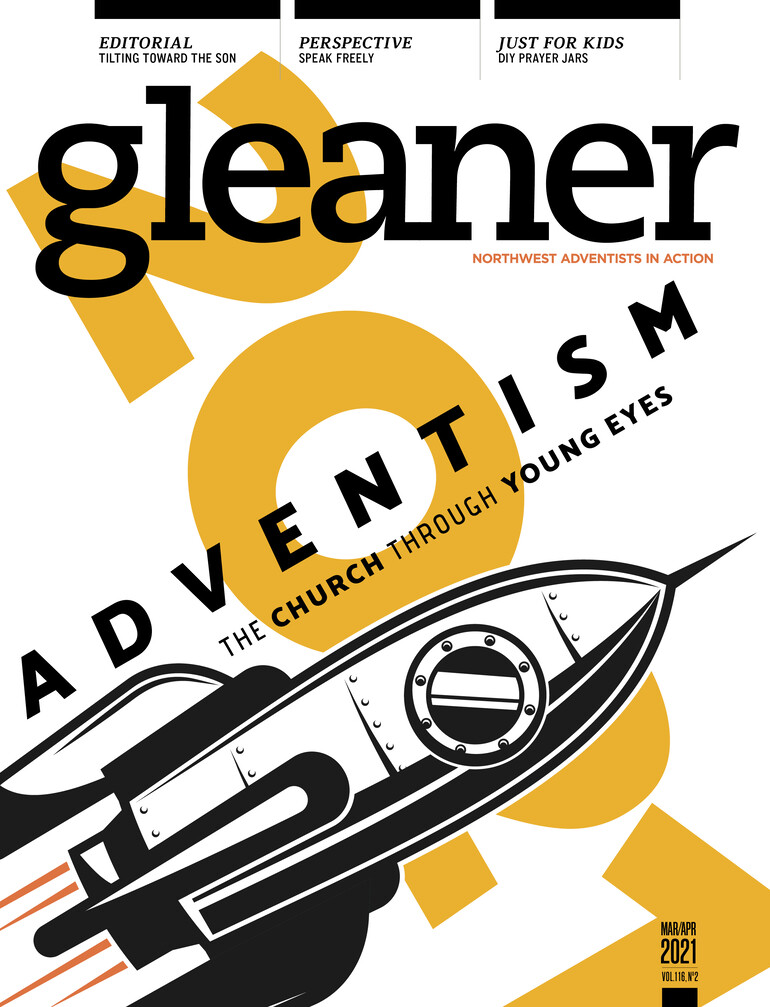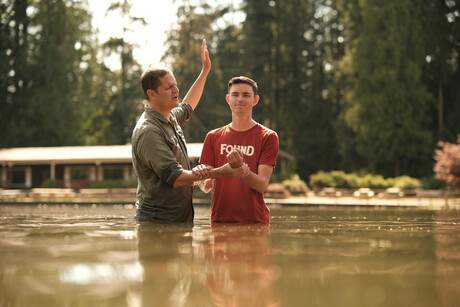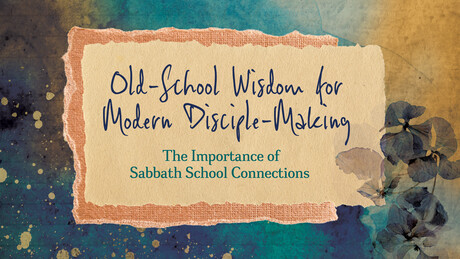You've probably been there, looking around a room full of people who all seem to know each other. They're laughing and chattering, while you stand awkwardly to the side wondering how to fit in. The host walks by with a tray of snacks, and you immediately offer to take over so you finally have something useful to do. "No, no, I've got it," your host replies. Bereft of any way to connect or contribute, you step back into the shadows and wonder why you ever came in the first place. You just want to leave.
Young adults often find themselves in a similar situation at church. American writer and businessman Alvin Toffler penned these words:
“The secret message communicated to most young people today by the society around them is that they are not needed, that the society will run itself quite nicely until they — at some distant point in the future — will take over the reins. Yet the fact is that the society is not running itself nicely ... because the rest of us need all the energy, brains, imagination and talent that young people can bring to bear down on our difficulties. For society to attempt to solve its desperate problems without the full participation of even very young people is imbecile.”
Toffler is known for his works discussing modern technologies, including the digital revolution and the communication revolution. His incisive commentary about our youth is more important in 2021 than ever before. Young people are an indispensable lifeline for society and for our church.
The Seventh-day Adventist Church is here today because a group of young people, including James and Ellen White, formed a core part of the leadership in the early days when it was formally organized in May 1863. Their energy and talents helped build up a foundation for the fledgling church.
Ellen White experienced firsthand the power of youth. In later years she would write about their importance in the book Education: “With such an army of workers as our youth, rightly trained, might furnish, how soon the message of a crucified, risen, and soon-coming Savior might be carried to the whole world!” (p. 271).
More than 150 years later, the Adventist Church is facing a twofold crisis. Young people are leaving the church at the same time the Adventist Church is facing the retirement of more than half its current leadership.
More than ever before the Adventist Church needs young people. What will the next decade look like? Who is going to take the torch and lead this faith community while we wait for Christ’s promised return?
Eager to Serve
Abby Alcantara, a junior religion major at Walla Walla University, knows she’s here for a reason. Listening to Abby recount her faith journey, it’s clear to see God’s divine hand at work. Considering all that’s happened in her life, she could have easily ended up in a very different place.
“I shouldn’t be here today,” says Abby. “I know God has brought me to where I am right now.”
Abby is a fourth-generation Adventist. “I’ve always believed what my parents believed,” she says. “What they believed was very foundational for me. It was a good structure for me as a kid growing up. I went to church and sang the songs and read all the stories.”
When Abby’s parents went through a divorce, life took a dark turn. The Sabbath School stories and songs didn’t feel the same. She doesn’t talk much about that time in her life, but one thing is clear: She wishes things had gone differently. She wishes her church would have done things differently.
When she started high school, Abby began to discover some important things about herself and God. She realized God was way more than what her parents had told her. He was a personal God. “My Bible teacher helped us cultivate our spiritual gifts,” says Abby. “He helped us understand that each one of us is unique and different and showed us how God can use those differences in special ways.”
When Abby graduated from high school, she decided to attend a local community college in her hometown in Medford, Oregon. “When I started college,” Abby says, “I fell backward and was out of touch spiritually. I went to church on Saturday, but there wasn’t a connection. The only time I felt a spiritual high was during the summer when I would go to Camp MiVoden for work.”
When Abby talks about camp, her eyes light up. Camp MiVoden showed her again how God is more than someone you read about in a book. He is someone that can and is working in people’s lives. Being able to witness that through camp ministry for the past four years has been a huge boost for Abby’s spiritual journey.
“I’ve noticed a huge spiritual turn these past four years,” says Abby. “But during the past two years I’ve realized where my own faith foundation was with God.”
While Abby grew up in the Adventist Church, she didn’t exactly know why she was a member. “Honestly, I’m still figuring it out," she says now. "I claim Adventism because it is the closest to what I see as Bible truth.”
Over the past four years, Abby’s camp experience has challenged her to find a life calling where she can use what she went through growing up to help others. Her search prompted her to keep reading her Bible and to dig deeper into it.
“One of the ways God showed up for me recently was how he brought me to Walla Walla University,” says Abby. “It was going to be my last summer at camp and I had plans in place to move on to other things. One day at the camp director, Jeff Wines, came up to me and asked me if I wanted to work for him as an intern. I was so excited because I had always wanted to work for him. Working as an intern at Upper Columbia Conference I was able to keep a job when many of my classmates weren’t able to keep a job because of the pandemic.”
The job at the conference was a growing experience for Abby. In addition, the finances from the internship allowed her to enroll for religion studies at Walla Walla University.
Over the past two years Abby has grown in her faith journey with God and her church. “Church isn’t just a building,” she says. “… It’s people. When we have a building, we have a hierarchy that comes into play. When we hear the word 'church,' we think of a steeple and bells. For me, church should be a safe place to grow and be open with each other.”
Abby describes her view of church as a place without entrance fees or requirements for people to feel welcome. “I’d love to have a place where you don’t have to put on a mask to appear perfect. I long for a place to be open and real with each other,” she says.
Abby wants to make a difference and serve. When asked about how she and her peers feel about working for God, she says, “I would like to see us be able to lead without fear. We want to help. We want to take action but we often have to second guess what we’re doing. Are our leaders going to despise us for this? There are leaders who are supportive, but you have to look for them. When we don’t have that support, we get nervous and fearful of getting involved.”
Leading by Example
Kaleb Jones is a first-year computer engineering student at Montana State University in Bozeman. He too was raised in an Adventist home. Like many young people, he didn’t find a real connection with God until a moment of crisis reared its ugly head.
“I was raised an Adventist,” says Kaleb. “My grandparents were missionaries. My dad taught us about the Bible, but I never developed a strong devotional life. I went to Adventist schools, I had Bible classes, and I was learning about God. But I never felt like I knew Him personally. I didn’t have that big conversion moment that I could point to.”
All that changed Kaleb’s junior year of high school. That’s when he almost lost his brother to suicide.
“My brother was going through a pretty bad depression,” he says. “We knew my brother was under the weather and struggling. We were worried about him but didn’t know the extent of his depression.”
Kaleb’s mother received a suspicious notification from her bank one Saturday morning. “My mom never checks her bank account on Sabbath, but that day she saw that my brother had rented a hotel room in Livingston, a town about 30 miles away,” says Kaleb.
“When my folks saw bank charge, they rushed to Livingston," Kaleb remembers. "My dad knocked on the door of his hotel room and found my brother crying his eyes out. He was about to end his life, and my parents got there in the nick of time.”
He continues: “That was the moment I can point to and say, 'This is where God showed up.' He definitely had a hand in saving my brother’s life. I can’t imagine life without him.”
It was a pivotal moment for the young man. “I consciously realized God exists," Kaleb explains. "He’s a personal God. He’s not just out there doing whatever He wants. He cares about us.”
Following his brother’s intervention, things began to change for Kaleb. He began to take his devotional life more seriously. He started going to Bible studies and becoming more involved in service.
This new walk with God hasn't been free of hardship for Kaleb. “Any relationship isn’t easy,” he admits. “There’s been many bumps along the way but I’m really passionate about service. I think that’s what makes my church really special. There’s something about the way we do it that stands out.”
Kaleb believes the Adventist Church isn’t perfect, and yet he believes there’s something that makes it special. When his brother’s life was spared, he experienced the struggle for human life between God and Satan.
“The Great Controversy is really interesting to me,” says Kaleb. “When you look at life through that lens, what’s happening around us makes a lot of sense. That framework really explains a lot that happens in our world.”
Kaleb says he is an Adventist today because of how Adventists interpret the Bible. “I feel you should be part of the denomination that you feel best interprets Scripture," he says. "For me, that’s the Adventist Church. We don’t agree on everything, but our core beliefs are Bible-based.”
This past summer Kaleb had opportunity to put his budding faith into practice. While working on a concrete construction crew, he had opportunity to test out something about evangelism his dad taught him growing up. “My dad always told me that people will see you Jesus through your actions,” says Kaleb. “I actually experienced that this summer. I didn’t have to confront the guys on my crew. They came to me and asked questions when they saw I was different. I don’t think it’s bad to preach Jesus, but I think what’s most important is that we live like Jesus.”
He knows people notice. “Most people feel Christians are hypocritical," he says. "They say we pick what we want from the Bible and use it as a weapon. That’s not what we want them to see. When we set an example with our lives, when we treat others like Jesus would treat them, people will come to us and ask questions.”
As Kaleb has grown in faith over the past couple of years, one thing troubles him. “Our church lacks members who are my age,” he says. “I’ve always wondered about that. Even in my own family, most of my siblings don't attend church anymore. We need to focus on getting more young people into the church or keeping them in the church. We are the ones who want to make positive change, who are motivated to make change and have the energy to get things done. I think that should be a pretty big goal.”
Kaleb is actively working to do something about missing youth. ”My buddy Derek help with Adventurers in our church,” he says. “We work with the little kids. Maybe if they see our example and see us involved in church life, they will stick around a little longer when they get to be our age.”
Encourage Us to Try
Colton Veldboom is the youth leader in his local church. He graduated in 2020 with his civil engineering degree from Montana State University.
“Before I started leading out,” says Colton, “I had been sitting in the church pew thinking about maybe asking if I could lead. I was sitting there, and the pastor came up to me and asked me if I wanted to lead the youth group. The Lord knows what He’s doing!”
He has seen God work many times since he’s taken on leadership responsibility. “There’s many times where you know He’s there,” he explains. “There’re a few times that stand out where I know God talked to me. I’ve felt that more in the last few months than I have ever before. I feel like my faith has grown stronger leading the youth group. It’s been very real.”
For the first three months Colton had his youth group focus on prayer and personal relationships. Each week the group would set a prayer challenge. One week the challenge was to ask God to teach them something they never knew before.
Usually kids checked in with their experiences on Sabbath. “On Tuesday that week, a kid messaged me,” says Colton. “He told me, ‘I have an answer. I’ve been praying that every morning and today I walked into work. My boss walked in and asked me if I wanted him to show me how to use the most expensive piece of machinery in the shop.’”
“I tell you what,” says Colton. “There is nothing cooler than seeing people you’re working with experience God.”
Colton has some definite opinions about how Adventists do church. That’s why he wanted to get involved in youth ministry. For him, evangelism isn’t about beasts and dragons. “For me, its about showing, not necessarily preaching,” he says. “There’s a time a place for everything. My mom has the famous line that says, ‘Nobody cares how much you know until they know you care.’”
“If you have a passion for something, someone can tell. I want to show that passion for God before I ever say anything. My generation is tired of evangelism seminars. I’ve been an Adventist my whole life, and I enjoy prophecy, but I don’t think the way we’re trying to do evangelism is connecting any more. The best way is to do what Jesus did.”
“It’s important for our church to feel like it’s a family. Let me give you an example," Colton offers. "I’ve always been super involved with my church. I remember the first time I went up front with a guitar. I couldn’t sing or play and yet everybody told me I did an incredible job. That stuck in my head. Let’s encourage each other, even when we don’t do things perfectly. If we don’t encourage people when they try to get involved in church, what is going to motivate them to ever want to try to do something again?”
Give Us Your Trust
Rachel Coffin is a junior studying psychology at Weimar Institute in California. She plans to become a counselor.
“I’m fascinated with human behavior and understanding the mechanisms of it and how the little things in life influence how we interact with people,” she says. “I want to give back and help in the ways that I’ve been helped in the past.”
Rachel’s faith journey is something she’s seen grow and develop, especially during the pandemic. “It hasn’t always been easy,” she says. “Growing up in the church, I’ve taken God for granted and assumed, because I’ve been around the church my entire life, I know what’s going on.”
But her perspective has changed. “Lately, I’ve realized I have no idea what’s going on," she admits. "Just because my parents go to church and I consider myself religious doesn’t mean I am a Christian. I don’t have faith just because I may be doing everything right.”
“I choose to belong to the Adventist Church because I really believe this is the movement that God started," Rachel says. "Because I’ve had my own personal experiences with God in this church, I believe this is where He’s called me to be.”
Rachel cares about her church and how others perceive it. “Personally, I think we need to move our church forward into the 21st century,” she says. She believes her generation is ready to help move things forward.
“Give us your trust. Give us your confidence. Trust begets trust,” Rachel says. “When you feel like there are people behind you who believe in you, you are more likely to work harder, to be more creative and to continue doing that job.”
Finding an outlet for those talents can be difficult. “It is very frustrating sometimes when you know you could do something, but there’s no place for you because all the positions have been filled by people doing those position for 30 or 40 years," she says. "Let us do it. If we mess up, then step in and show us how you would go about it. Give us the guidance. Give us the direction, but let us do it. That will motivate more people to stay if they feel like there is a place for them to be involved instead of just filling the pews on Sabbath.”
Through Young Eyes
While the Adventist Church is struggling to keep young people engaged, there are those like Abby, Kaleb, Colton and Rachel. These young eyes see a church they are passionate about. They love their faith community and want to make a difference. It’s up to us to encourage them and let them lead.
In Rachel's words, “It’s time to hand the reins over to this generation.” It is time to work together to grow the Adventist Church to make it a place where “everyone can be involved no matter whether it is a small position or a large position.” It’s time for the young and old, through the power of the Holy Spirit, to build vibrant, active and safe place for all whom God sends our way.









